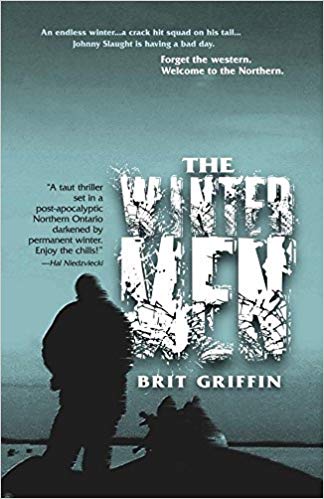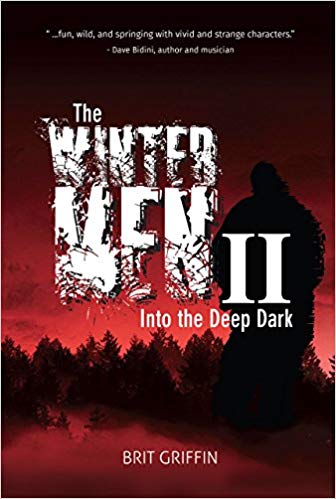
Journey Into the Realm of Bookselling by Cory Gaudette
STORIES, INSIGHTS AND PRACTICING MINDFULNESS
Writing in the Anthropocene by Brit Griffin

 My imagination has been tuned into the ticking of the Doomsday clock for some time. The
crucible of extreme events, of catastrophe and Armageddon, have always been of interest. How
we behave in these worst moments says something about us as human beings. That interested
me. And so it was natural that my first work of fiction would be speculative fiction.
The Wintermen series started out as speculative fiction about climate change. I probably started
thinking about the storyline in 2010, intrigued more by the idea of perpetual winter than climate
change. As the first book went from draft to final version it evolved, more preoccupied by a
warming climate, by the consequences of our addiction to fossil fuels. I spent the next several
years imagining and writing about a possible future, exploring a cautionary scenario that helped
me think about what might be and how we could act to avoid that future.
Problem is, it is no longer speculative.
There is no more future tense when it comes to climate change, there is only the here and now.
As I write, Antarctica recorded its hottest day ever. Climate change rages through our daily
media coverage; maybe even now reaching a toxic tipping point of media saturation. Too many
animals reduced to ash, too much of the mass extinctions. Too many homes washed away or
burnt. It is not possible for me to write about climate change as a what if, and that changes the
project. So when I came to write the third, and final, book in the Wintermen series (At the End of
the World, fall 2020), it was with an understanding of it as a book of transition and uncertainty.
So how then to write about climate change now? It is time maybe to shift from the dystopian
project to the utopian one. If we could tear it all down, what would we want instead? Art can
help us imagine a different way of being, to resist an apocalyptic machismo that turns a select
few into successful preppers and the rest of us into victims. The imagination can be a sharp
weapon. We could use it like a crowbar, to pry open the narrow vision of how humans and non-
humans can be in the world together. To see more wholistic visions, and versions, of ourselves.
My imagination has been tuned into the ticking of the Doomsday clock for some time. The
crucible of extreme events, of catastrophe and Armageddon, have always been of interest. How
we behave in these worst moments says something about us as human beings. That interested
me. And so it was natural that my first work of fiction would be speculative fiction.
The Wintermen series started out as speculative fiction about climate change. I probably started
thinking about the storyline in 2010, intrigued more by the idea of perpetual winter than climate
change. As the first book went from draft to final version it evolved, more preoccupied by a
warming climate, by the consequences of our addiction to fossil fuels. I spent the next several
years imagining and writing about a possible future, exploring a cautionary scenario that helped
me think about what might be and how we could act to avoid that future.
Problem is, it is no longer speculative.
There is no more future tense when it comes to climate change, there is only the here and now.
As I write, Antarctica recorded its hottest day ever. Climate change rages through our daily
media coverage; maybe even now reaching a toxic tipping point of media saturation. Too many
animals reduced to ash, too much of the mass extinctions. Too many homes washed away or
burnt. It is not possible for me to write about climate change as a what if, and that changes the
project. So when I came to write the third, and final, book in the Wintermen series (At the End of
the World, fall 2020), it was with an understanding of it as a book of transition and uncertainty.
So how then to write about climate change now? It is time maybe to shift from the dystopian
project to the utopian one. If we could tear it all down, what would we want instead? Art can
help us imagine a different way of being, to resist an apocalyptic machismo that turns a select
few into successful preppers and the rest of us into victims. The imagination can be a sharp
weapon. We could use it like a crowbar, to pry open the narrow vision of how humans and non-
humans can be in the world together. To see more wholistic visions, and versions, of ourselves. Paid Internship Opportunity
We are looking for Indigenous writers and artists for our next anthology

Book captures rise of Duhamel and Radford
The behind-the-scenes story of one of Canada’s most accomplished skating pairs team is now available. Come celebrate the launch of Soulmates on Ice: from hometown glory to top of the podium at Salute Coffee Company, 73 Elm St., on Oct. 27 from 3-5 p.m.
Join Latitude 46 Publishing and Sudbury-based sports journalist Laura E. Young for an afternoon of reading and coffee.
In Soulmates, Young chronicles the unlikely path Meagan Duhamel of Lively and Eric Radford followed on the way to the top of the world in figure skating.
The two-time world pairs champions and three-time Olympic medalists reflect on how they developed a working relationship and honed their resilience in a sport that often left them bloodied and bruised. Here, Young answers some questions about her book.
Q & A with Laura E Young
- Why was it important for you to tell this story?
Lat46 launches new anthology of Northern Ontario experiences
Telemarketing: The Bottom Rung
Latitude 46 Publishing Launches 5 New Books
A Matter of Will by Rod Carley
North Bay director, playwright, actor and author Rod Carley said the main character Will Crosswell is a composite of many people he’s met in his life.Rod Carley is the author of A Matter of Will. (Roger Corriveau/CBC)
Wolf Man by Suzanne Charron
In the early 1920s, a man named Joe Laflamme moved to Gogama, Ont. to transport lumber.Suzanne Charron is the author of Wolf Man. (Markus Schwabe/CBC)
Wazzat by Roger Nash
In the 1970s, Canadian poet Al Purdy once told Sudbury’s Roger Nash that good poetry should surprise the reader. “What I’m trying to do when I’m writing is identify my own sense of ‘wazzat’ of wonder of the world around me, in Sudbury in particular,” Nash said.Roger Nash is the author of Wazzat. (Roger Corriveau/CBC)
River of Fire: Conflict and Survival Along the Seal River by Hap Wilson
What’s it like to be a river guide on one of Canada’s most dangerous whitewater rivers? Hap Wilson’s book recounts his experience as a guide on the Manitoba river. “There were several wildfires burning in northern Manitoba,” he said. “After a few days, we ended up confronting a fire the size of Prince Edward Island.” The crew had to avoid the fire which was jumping back and forth across the river. Wilson said they also had to wrap wet bandanas on their faces to be able to breathe.Hap Wilson is the author of River of Fire: Conflict and Survival Along the Seal River. (Markus Schwabe/CBC)
Surviving Stutthof: My father’s memories behind the Death Gate by Liisa Kovala
Growing up, Liisa Kovala knew her father had experienced something during World War II, but said she didn’t really understand what had happened until she got older. She eventually learned about her father’s time in Stutthof, a concentration camp in Nazi-occupied Poland. Kovala said it took a long time for her father to open up, but he eventually told her harrowing details of grueling work, starvation diets and abuse.Liisa Kovala is the author of Surviving Stuffhof: My father’s memories behind the Death Gate. (Roger Corriveau/CBC)